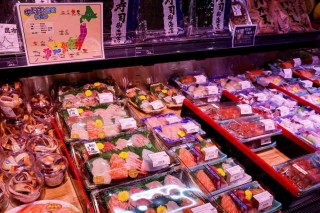Loading
Search
▼ Japanese Restaurants In Hong Kong Expect Dip In Business With Import Ban On Seafood From Japan
- Category:Other
One observer believes the supply shortage, however, will not lead to a spike in prices.
Some Japanese restaurants in Hong Kong are expecting a 30 per cent dip in business, after the city's import controls on seafood from 10 Japanese prefectures kicked in on Thursday (Aug 24).
This comes as Japan began discharging treated radioactive wastewater from the Fukushima nuclear plant.
Hong Kong is Japan's second largest market for seafood exports after mainland China, and the import ban has placed some eateries in a spot.
“We expect that business will further drop by another 20 to 30 per cent or even more for some high-end restaurants,” said Hong Kong Federation of Restaurants and Related Trades president Simon Wong.
“For the high-end restaurants, most of their products are directly air-flown from Japan to Hong Kong on the same day. And if they don't have enough varieties or quantity of fishery products for the restaurant, then the business will be affected.”
Mr Wong believes the supply shortage will not lead to a spike in price, as the priority of merchants is to retain their customers.
The import ban applies to 10 prefectures including Tokyo, Fukushima and Nagano. It covers all fresh, frozen, chilled, dried or processed seafood, as well as sea salt and seaweed.
Overall, this accounts for about 10 per cent of Japanese seafood imports into Hong Kong.
Neighbouring Macau also implemented the ban from Thursday, covering goods from the same Japanese regions.
G One Sushi Japanese Restaurant owner Carl Siu said customer's confidence is a big concern for his business.
“Our conservative estimate is that business will initially decline by 40 per cent to 50 per cent,” he said.
“We believe that the quality of Japanese seafood is incomparable to other regions. We have been seeking alternatives from other sources to provide our customers with multiple choices.”
The ban will hit his restaurant hard, as the products from the banned Japanese regions account for about 20 per cent of his offerings.
"For instance, our sea urchins are from Hokkaido, and most of the farmed fishes are from Kyushu. However, since many oyster farms are located in the banned prefectures, that would bring severe impact (to our supplies),” Mr Siu said.
“If there could be something like consumer vouchers or direct financial support (from the government) for our restaurants, that would be the best solution.”
The government had earlier said it will not disburse financial support, as it has given ample time for restaurants to plan ahead.
But many are only just recovering from the economic fallout of the COVID-19 pandemic restrictions, said observers.
Some Japanese restaurants in Hong Kong are expecting a 30 per cent dip in business, after the city's import controls on seafood from 10 Japanese prefectures kicked in on Thursday (Aug 24).
This comes as Japan began discharging treated radioactive wastewater from the Fukushima nuclear plant.
Hong Kong is Japan's second largest market for seafood exports after mainland China, and the import ban has placed some eateries in a spot.
“We expect that business will further drop by another 20 to 30 per cent or even more for some high-end restaurants,” said Hong Kong Federation of Restaurants and Related Trades president Simon Wong.
“For the high-end restaurants, most of their products are directly air-flown from Japan to Hong Kong on the same day. And if they don't have enough varieties or quantity of fishery products for the restaurant, then the business will be affected.”
Mr Wong believes the supply shortage will not lead to a spike in price, as the priority of merchants is to retain their customers.
SEEKING ALTERNATIVES FROM OTHER SOURCES
The import ban applies to 10 prefectures including Tokyo, Fukushima and Nagano. It covers all fresh, frozen, chilled, dried or processed seafood, as well as sea salt and seaweed.
Overall, this accounts for about 10 per cent of Japanese seafood imports into Hong Kong.
Neighbouring Macau also implemented the ban from Thursday, covering goods from the same Japanese regions.
G One Sushi Japanese Restaurant owner Carl Siu said customer's confidence is a big concern for his business.
“Our conservative estimate is that business will initially decline by 40 per cent to 50 per cent,” he said.
“We believe that the quality of Japanese seafood is incomparable to other regions. We have been seeking alternatives from other sources to provide our customers with multiple choices.”
The ban will hit his restaurant hard, as the products from the banned Japanese regions account for about 20 per cent of his offerings.
"For instance, our sea urchins are from Hokkaido, and most of the farmed fishes are from Kyushu. However, since many oyster farms are located in the banned prefectures, that would bring severe impact (to our supplies),” Mr Siu said.
“If there could be something like consumer vouchers or direct financial support (from the government) for our restaurants, that would be the best solution.”
TAKING A CONSERVATIVE AND SAFER APPROACH
The government had earlier said it will not disburse financial support, as it has given ample time for restaurants to plan ahead.
But many are only just recovering from the economic fallout of the COVID-19 pandemic restrictions, said observers.
- August 28, 2023
- Comment (0)
- Trackback(0)


